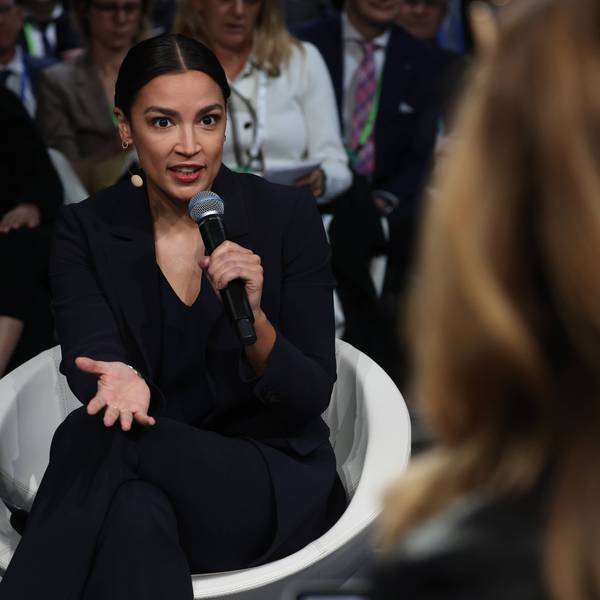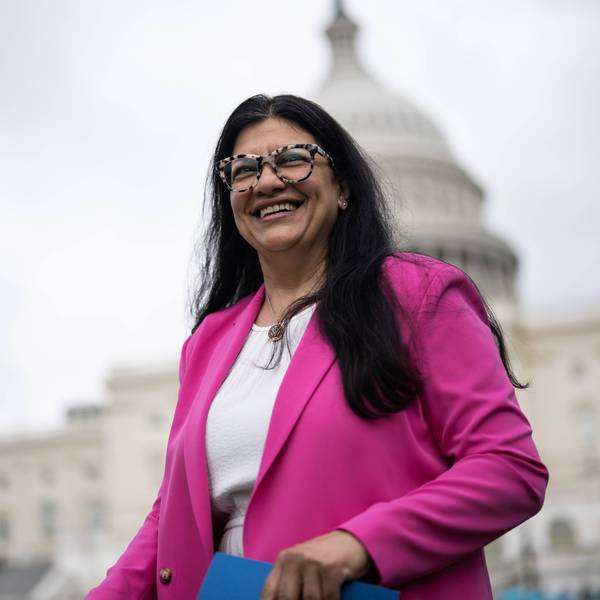In April of 1999, the new leaders of the Democratic Party -- or, as the Wall Street Journal called them, the "chief theorists of the Third Way" -- came together for a major conference in Virginia.
The goal of the conference, attended by such prominent figures as President Bill Clinton and British Prime Minister Tony Blair, was to set forth a new agenda for Democratic politics, one that would eschew traditional notions of "tax and spend" liberalism and articulate a way forward, one that held appeal beyond the constituencies fostered by the New Deal coalition and its successors.
In an introductory speech, Al From, founder of the then-surging Democratic Leadership Council, succinctly worded the fundamental values of the so-called New Democrats.
"Its first principle and enduring purpose is equal opportunity for all, special privilege for none," From proclaimed. "Its public ethic is mutual responsibility. Its core value is community. Its outlook is global, and its modern means are fostering private-sector economic growth -- today's prerequisite for opportunity for all -- and promoting and empowering government that equips citizens with the tools they need to get ahead."
"Beneath the soaring rhetoric of hope and change that accompanied the Obama administration, over a decade later, the DLC's playbook remains a powerful force."
Far from radical, the stated goal of the Third Way was to chart a path that led away from the labor-left alliance of the early-to-mid twentieth century and to foster new, more lucrative, relationships. Shrouding their appeals, as From did above, in the garb of necessary change in the face of technological advancements and globalization, the Third Way theorists set forth, as Robert Dreyfuss observed, a "message of pro-market moderation," which tends to be "just what organized business wants to hear."
Particularly since the 1990's, the Democratic Party's vision has been underpinned by the tenets of the Third Way, and its coffers have been filled by those who share this vision: Professionals, technocrats, financiers.
While the party still professes its dedication to the working class, as Hillary Clinton did in her speech at the Democratic convention, a closer look at its donor base -- along with its voter demographics -- reveals a different story: Increasingly, the Democratic Party is, as Lee Drutman has put it, "replacing Republicans as the preferred party of the very wealthy."
"In 2012, something unusual happened. The wealthiest 4 percent of voting-age Americans, by a narrow plurality, supported a Democrat for president," Drutman writes. He goes on to note that far from "a blip," 2012 marked the culmination of a "phase shift."
Like Democrats' abandonment of the New Deal tradition, this shifting foundation of support took decades and was dependent upon a variety of forces. Most crucially, though, was the rapid rise of wealth and income inequality.
As progressive activists succeeded in pushing through consumer protection and environmental measures throughout the 1970's, the business class mounted an offensive that continues in the present -- one that would accelerate soaring inequality with its emphasis on deregulation and lower taxes, along with its growing ability to outsource decent-paying jobs.
The results were striking, but predictable.
"The share of total income earned by the top 1% of families was less than 10% in the late 1970s," the economists Thomas Saez and Gabriel Zucman have written. By 2012, they noted, this same group's share had more than doubled.
Democrats faced a choice: Would they ride the tide of growing inequality and globalization, content to side with those who emerged on the winning end, or would they foster a coalition of the working class and progressive organizations to combat these trends that posed a significant threat to organized labor, and to the middle class broadly?
The New Democrats, by then the core of the party, chose the former.
"Despite off-the-charts wealth inequality," writes Connor Kilpatrick, "Democratic Party liberals have been concerned not with an egalitarian reckoning to unite the have-nots against the haves but with inclusion: bringing different 'interest groups' into the professional class while managing everyone else's expectations downward."
These interest groups were indeed various, and they reflected the party's changing identity: As the influence of labor steadily declined in the face of a relentless business onslaught, Democrats increasingly turned to high-tech industry, and to Wall Street institutions, for both cash and intellectual ammunition.
The administration of Bill Clinton was the first to truly solidify these trends. Stocking key advisory positions with Wall Street financiers and technocrats, the Clinton administration signed into law -- and repealed -- measures that embodied both its dedication to the free market consensus and its abandonment of blue-collar America.
From their support for the North American Free Trade Agreement and Wall Street deregulation to their passage of the omnibus crime bill and welfare reform -- against the protests of former Clinton allies, one of whom called welfare reform "fatally flawed, callous, anti-child" and "indefensible" -- New Democrats signaled clearly to the business community, and to the masses, their intentions.
"Today's is not your father's Democratic Party. Though the dwindling chorus of party progressives provides counterpoint, today's Democrats are proud to claim the mantle of budgetary moderation," Robert Dreyfuss summarized in 2001. "They are the party of Ending Welfare As We Know It, the party of The Era of Big Government Is Over."
And beneath the soaring rhetoric of hope and change that accompanied the Obama administration, over a decade later, the DLC's playbook remains a powerful force.
The campaign of Bernie Sanders made great progress in calling attention to these tendencies and bringing to the surface the deep gulf between the left and the Democratic Party; but despite progressive pressure, corporate Democrats are now, notes Thomas Frank, "pivoting to the right just as other Democrats did before her because...because, well, that's what Democrats always do."
This year, far from standing on what many have celebrated as "the most progressive platform in history," Hillary Clinton's rightward lurch has been particularly brazen and unapologetic.
Justifying the shift in terms of defeating Donald Trump, Clinton and her allies have been "aggressively courting Republican leaders" and their right-leaning donors within the business community (she has also chosen as her running mate a pro-Wall Street "cash machine").
Earlier this week, Hewlett Packard executive Meg Whitman, typically a strong fundraiser for the Republican Party, announced that she would be supporting Clinton, both at the ballot box and through donations.
This endorsement followed those of Michael Bloomberg, Mark Cuban, and Warren Buffett.
But the focus on high-profile billionaires obscures the broader discussion of the Democratic Party's move away from labor and toward wealthier, white-collar professionals, whose views on economic issues in particular are often antithetical to the ambitious changes necessary to combat the trends that have left millions without even the most basic of necessities.
Hillary Clinton has, in light of these recent endorsements, predictably attempted to differentiate between "good" billionaires and "bad" billionaires.
"Economic elites, whether they identify as Democrats or Republicans, simply don't care very much about income inequality."
"He shared," Clinton said of billionaire Mark Cuban. "He shared the benefits with everybody who helped him be a success."
But as a 2015 study conducted by economist Raymond Fisman and three of his colleagues makes clear, economic elites, whether they identify as Democrats or Republicans, simply don't care very much about income inequality -- a fact that should enhance our skepticism in the coming weeks, as Democrats attempt to paint a glowing portrait of their wealthy allies.
"Elite Americans are not just middle-class people with more money," Fisman writes. "They display distinctive attitudes on basic moral and political questions concerning economic justice. Simply put, the rich place a much lower value on equality than the rest. Even when they self-identify as progressive Democrats, elite Americans value equality less highly than their middle-class compatriots."
Because economic elites, as Martin Gilens and Benjamin Page have documented, have near-total control of the policy direction of the United States, the response to soaring economic equality has been little more than a yawn. All the while, as CEOs watch their incomes soar, wages for the majority of American workers remain stagnant, the middle class continues its decline, and crippling poverty persists.
And far from repudiating the party's abandonment of the victims of capitalism, high-ranking Democratic officials seem to have embraced it. Speaking with the Washington Post, New York Senator Chuck Schumer pondered the bright side of losing the working class.
"For every blue-collar Democrat we will lose in western Pennsylvania," he said, "we will pick up two or three moderate Republicans in the suburbs of Philadelphia."
Schumer's singular focus on gathering votes nicely encapsulates the Democratic Party's political vision, which sees as the only endgame the election of more Democrats; ideology and principle have taken a backseat to electoral strategy, and we are reassured, time and time again, that the next Democrat will be better than the last.
But the evidence says otherwise.
Throughout the primary process, Democrats attempted to both voice support for robust campaign finance reform and reap the rewards offered by Wall Street and major hedge-funds. And if history is any guide, we can look forward to business as usual. As Matt Taibbi has noted, "politicians who promise they can deliver change while also taking the money, mostly just end up taking the money."
But the distant past isn't our only point of reference: This year's Democratic convention, endlessly hyped and lavished with praise by Republicans and Democrats alike, was, in the words of David Dayen, "one big corporate bribe." Lobbyists seem to understand that the rhetoric is empty, that it is just politics; as such, they emerged, after a testy primary, "undeterred and mostly unabashed."
Most Americans recognize what is happening. They see that the two dominant political parties are failing to deliver anything resembling their soaring promises; they see that too much power rests in the hands of too few companies; they see that the wealthiest exert disproportionate influence on the political process.
But as long as the legislative process is dominated by parties that care first and foremost about "catering to their wealthiest supporters," systemic change is impossible.
For the business class to which Republican and Democratic leaders are now dedicated is not content to merely squash the social democracy of the Bernie Sanders coalition; it is, as Shawn Gude concludes, committed to doing away with "that most basic condition of democratic rule -- that ordinary citizens, not corporate paymasters, set the agenda."
When, to paraphrase Eddie Glaude, will we finally turn our backs on the parties that have turned their backs on the most vulnerable?



